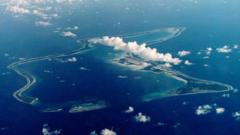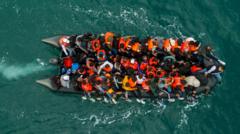Sri Lankan Tamil Migrants Brought to UK from Diego Garcia
A group of approximately 60 Sri Lankan Tamil migrants, who have been stranded for over three years on Diego Garcia, a remote Indian Ocean island housing a strategic UK-US military base, have been brought to the United Kingdom. The migrants will be permitted to remain in the country for six months, with financial support from the Foreign Office.
The group, which includes 16 children, had been living in a makeshift camp since October 2021, when they became the first people to file asylum claims on the island. Their living conditions were described as extremely challenging, with migrants housed in military tents plagued by leaks and rat infestations. During their time on the island, they experienced multiple hunger strikes, self-harm incidents, and suicide attempts.
A government spokesperson characterized the relocation as a “one-off” decision due to the exceptional nature of their circumstances and welfare concerns. Tessa Gregory from Leigh Day law firm, representing some migrants, called it the “only sensible solution to end the humanitarian crisis.”
Most of the migrants have been awaiting decisions on international protection claims. Eight have been granted protection, meaning they cannot be returned to Sri Lanka. Two men with criminal convictions and another under investigation remain on the island.
The migrants’ arrival coincides with ongoing uncertainty about the territory’s future. The UK recently announced plans to cede control of the Chagos Islands to Mauritius, though the new Mauritian prime minister has reservations about the deal and requested an independent review.
The territory has been costly for the UK, with Foreign Office communications indicating potential annual migrant-related expenses of £50 million. In letters to the migrants, the Home Office stressed that their entry is temporary and does not constitute permanent settlement or refugee status. They will not be permitted to work during their six-month stay.
The government has addressed potential concerns about creating a “backdoor migration route” by arranging to send future arrivals to St. Helena, another UK territory, and suggesting that Mauritius will eventually take responsibility for migrants once a sovereignty agreement is fully implemented.
One migrant expressed hope for a new beginning, stating, “I hope to turn a new page. I hope my health will improve and I will transform into a new person.”
The complex legal battles surrounding these migrants highlight the intricate diplomatic and humanitarian challenges associated with the Diego Garcia territory. The UK Foreign Secretary, David Lammy, has described the ongoing territorial negotiations as a “good deal” that addresses concerns about the strategic military base’s future.
This unprecedented relocation represents a significant moment for these migrants, offering them a temporary reprieve from the challenging conditions they endured on Diego Garcia and an opportunity to consider their long-term options.




